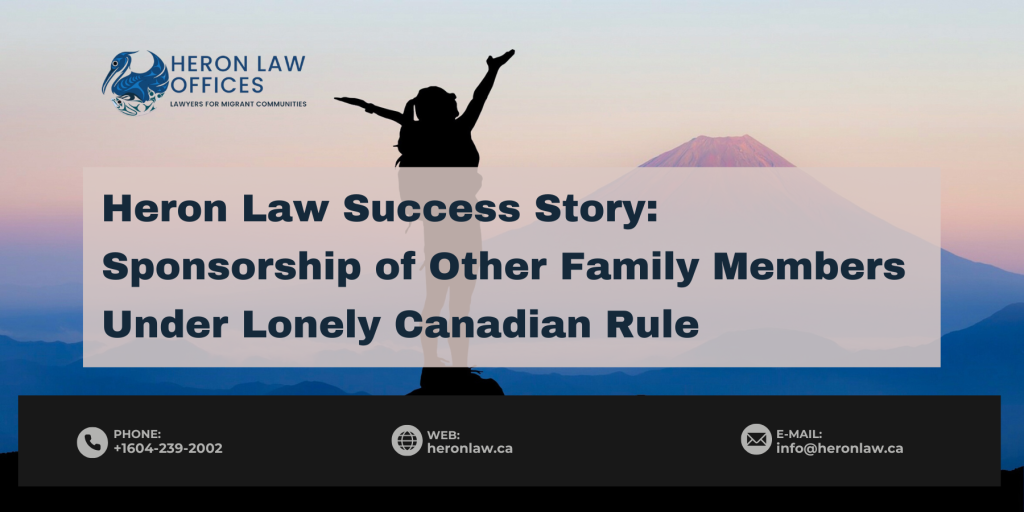By Laura Schemitsch, Canadian Immigration and Refugee Lawyer and Torah Justine Lee, Articling Student
Canadian citizens and permanent residents can only sponsor relatives such as a brother, sister, aunt, or uncle to become a permanent resident of Canada in very specific situations. Sponsorship is typically limited to spouses and common-law partners, dependant children, and parents and grandparents.
Heron Law Offices recently assisted a client in their application to sponsor their nephew under the Family Class through what is often referred to as the “Lonely Canadian rule”. Subsection 117(1)(h) of the Immigration and Refugee Protection Regulations (“IRPR”) provides the authority to sponsor an “other relative”:
117 (1) A foreign national is a member of the family class only if, with respect to a sponsor, the foreign national is:
(h) a relative of the sponsor, regardless of age, if the sponsor does not have a spouse, a common-law partner, a conjugal partner, a child, a mother or father, a relative who is a child of that mother or father, a relative who is a child of a child of that mother or father, a mother or father of that mother or father or a relative who is a child of the mother or father of that mother or father
- (i) who is a Canadian citizen, Indian or permanent resident, or
- (ii) whose application to enter and remain in Canada as a permanent resident the sponsor may otherwise sponsor.
Per IRCC’s guidance:
You may sponsor one relative, related by blood or adoption, of any age, if you meet all of these conditions:
- you (the person who wants to sponsor your relative) don’t have a living relative you could sponsor instead, such as a:
- spouse
- common-law partner
- conjugal partner
- son or daughter
- parent
- grandparent
- orphaned brother or sister
- orphaned nephew or niece
- orphaned grandchild
- you (the potential sponsor) don’t have any relatives (aunt or uncle or any of the relatives listed above), who is a:
- Canadian citizen
- permanent resident
- registered Indian under the Indian Act
In the present case, the Sponsor, having lost both his grandparents, parents, his common-law partner, and having no children, met the requirements to sponsor an “other relative.” Each of these facts required further documentation as part of the application.
Following the submission of the application, the sponsor was required to provide a detailed family information sheet.
As a result of a minor error by the sponsor in recalling the dates of birth for one family member, our client received a procedural fairness letter in which the Officer expressed concerns that the Sponsor had a minor niece abroad who could be sponsored instead under s. 117(f) IRPR. The Officer requested proof that the niece was not an orphan. The Sponsor realized their minor error and we assisted our client in proving to the Officer that there was no other relative who could be sponsored instead under s. 117(1)(a)-(g) IRPR.
The application was subsequently approved, and the Applicant was instructed to land in Canada as a permanent resident.
The Sponsor in this case sought to bring his nephew to Canada under the Family Class, which is designed to support family reunification. This was a unique and complex sponsorship application, however, upon consulting with HLO and retaining us for the application, we helped the Sponsor and Applicant achieve their intended outcome within 15 months.
If you need assistance with a sponsorship application or procedural fairness letter response, contact Heron Law Offices today for a consultation to discuss your options.
Updated on March 14, 2025
The client has kindly left us a 5-star Google Review regarding this matter.





